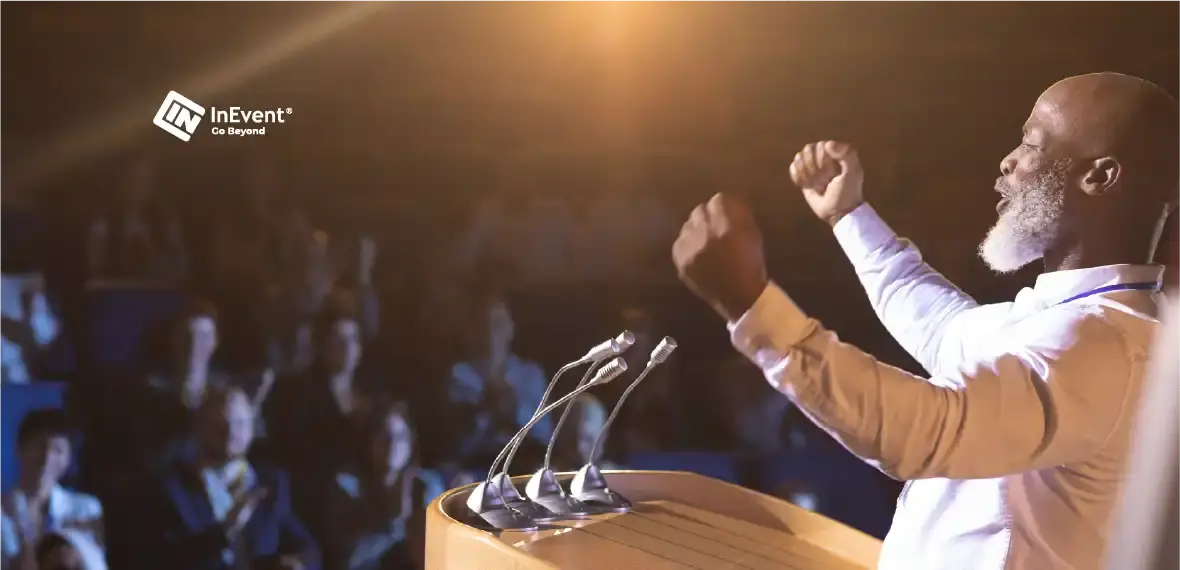Posted on December 25, 2023
Did you know that events with engaging speakers see a 30% increase in attendee satisfaction? Finding the right speaker for your event can be the deciding factor between its success or failure. Engaging speakers captivate audiences, inspire discussions, and leave lasting impressions. However, securing top-notch speakers doesn’t always mean going after big names.
The ideal speaker is often a hidden gem who can connect deeply with your audience without demanding a hefty fee. It’s clear that a great speaker is key to a successful event, but how do you find these hidden gems? Especially when budget constraints and a lack of connections pose challenges. In this post, we’ll explore strategies for finding ideal speakers for your events, moving beyond the well-known celebrity speakers, and focusing on those who can deliver impactful presentations.
3 Strategies for Identifying Ideal Speakers

When searching for the perfect speaker, thinking outside the box is essential. Here are some strategies to help you uncover exceptional speakers who can make your event stand out:
Identifying Your Needs
Before you start your search, clearly define what you’re looking for in a speaker. Understanding your event’s theme and target audience is crucial. Are you hosting a tech conference, a corporate workshop, or an inspiring community event? Knowing your audience’s preferences and the type of expertise you need will narrow down your search effectively.
- Define Your Event Theme and Audience: Tailor the speaker to match the event’s theme and the audience’s interests. For instance, a motivational speaker with experience in overcoming adversity would be perfect for a corporate workshop aimed at team building.
- Desired Speaker Expertise and Style: Consider whether you need an engaging storyteller, a data-driven expert, or a panel discussion moderator. The presentation style should align with the event’s goals.
Look Beyond the Obvious
Often, the most engaging speakers aren’t household names. Exploring lesser-known experts can lead you to captivating presenters who bring fresh perspectives, and it also helps you cut down on costs.
- Industry Associations and Publications: These are goldmines for finding thought leaders who are respected in their fields but might not be widely known outside their niche. For example, the American Marketing Association (AMA) regularly features up-and-coming marketing experts.
- Social Media Platforms: LinkedIn and Twitter are excellent platforms for discovering professionals who share valuable insights and have a strong following in your industry. Hashtags like #EventProfs or #MarketingSpeakers can lead you to potential speakers.
- Universities and Research Institutions: Academics and researchers are often willing to speak at events to share their latest findings. They can provide in-depth knowledge on specialized topics. For instance, contacting a university’s communications department might connect you with an expert in digital media trends for events or statistically proven facts for a more impressive presentation.
- Past Conferences and Events: Review the speaker lists of past events similar to yours. If a speaker received positive feedback, they might be a good fit for your event. TEDx events, for example, often feature brilliant speakers who aren’t globally famous but are incredibly engaging.
The Power of Networking
Your network can be an invaluable resource when searching for speakers. Personal recommendations often lead to finding passionate and experienced speakers.
- Colleagues and Industry Professionals: Ask your colleagues, industry contacts, and past attendees for speaker recommendations. Personal endorsements can provide assurance of a speaker’s abilities and fit for your event.
- Attend Industry Events: Networking at other conferences and events can introduce you to potential speakers. Engaging with them personally lets you gauge their presentation style and expertise first-hand.
By following these strategies, you’ll be well on your way to finding speakers who can deliver powerful presentations and leave a lasting impact on your audience.
How To Evaluate and Select the Perfect Speaker For Your Event
Once you’ve identified potential speakers, the next step is to evaluate and select the best fit for your event. Here’s how to ensure your chosen speaker engages and inspires your audience:
Qualities of a Great Speaker

Understanding what makes a speaker effective is key to making the right choice. Look for the following qualities:
- Expertise in the Event Topic: Ensure the speaker deeply understands the subject matter. They should bring valuable insights and knowledge that align with your event’s theme.
- Engagement Skills: The ability to captivate and engage the audience is crucial. Look for dynamic, relatable speakers who can tell compelling stories.
- Strong Presentation Skills: Clear communication and confident stage presence are non-negotiable. Great speakers are articulate, well-paced, and able to hold the audience’s attention.
- Positive Reputation: Research the speaker’s past engagements and feedback. A speaker with a track record of positive reviews is likely to perform well at your event.
Evaluating Potential Speakers
Now that you know what to look for, here’s how to assess whether a speaker is the right fit for your event:
- Review Past Presentations: Watching videos of past presentations or TED Talks can give you a sense of a speaker’s style and effectiveness. Pay attention to how they engage the audience and present their ideas.
- Speaker Websites and Social Media: A speaker’s online presence can provide valuable insights into their expertise and approach. Look for blogs, articles, or social media posts showcasing their knowledge and field engagement.
- Contact References: Contact event organizers who have worked with the speaker before. Ask about their experience and whether the speaker met their expectations.
- Direct Communication: Don’t hesitate to have a conversation with the speaker. This can help gauge their enthusiasm for your event and ensure they understand your objectives.
Making the Ask: Booking Your Ideal Speaker (Without Breaking the Bank)
Securing the perfect speaker for your event involves more than just finding the right person; it also requires a strategic approach to booking them. Here’s how to do it without exceeding your budget.
Crafting a Compelling Invitation
Your invitation should make the speaker excited about participating in your event. Here’s how to craft a compelling message:
- Clearly Outline Event Details: Provide an overview of your event, including the theme, date, location, and target audience. The more details you provide, the easier it will be for the speaker to understand the context and tailor their presentation.
- Highlight the Benefits: Emphasize what’s in it for them. Benefits could include exposure to a large audience, networking opportunities with industry leaders, and sharing their expertise with an engaged audience.
- Be Transparent About Budget: Honesty is crucial. If you have budget limitations, be upfront about them. Offer alternative compensation options such as honorariums, travel reimbursements, or accommodations. Sometimes, speakers are willing to accept lower fees for the opportunity to gain exposure or support a cause they care about.
Negotiating Speaker Fees
Negotiation doesn’t have to be daunting. Here are some tips to help you manage this process smoothly:
- Research Typical Fees: Understand the standard rates for speakers in your industry and your event type. This knowledge will give you a solid foundation for negotiation.
- Be Prepared to Negotiate: Approach negotiations with flexibility. Discuss options like splitting payments, providing in-kind benefits (e.g., promotional opportunities), or offering future speaking engagements.
- Offer Non-Monetary Incentives: Sometimes, speakers value opportunities beyond monetary compensation. Offer benefits such as co-branding opportunities, media exposure, or exclusive networking events. These can particularly appeal to speakers looking to build their brand or network.
Logistics and Follow-Up
Ensuring a smooth experience for your speaker involves careful planning and clear communication:
- Travel and Accommodation Arrangements: If applicable, handle all travel and lodging details meticulously. Provide clear instructions and support to make their journey as comfortable as possible.
- Establish a Communication Plan: Maintain regular contact with the speaker leading up to the event. Provide them with all necessary information, including the event schedule, audience demographics, and technical requirements. This ensures they are well-prepared and aligned with your event goals.
- Post-Event Follow-Up: Follow up with a thank-you note and feedback after the event. This gesture shows appreciation and helps build a lasting relationship for potential future collaborations.
Conclusion
Finding the right speaker for your event is crucial for its success. By looking beyond big names and focusing on lesser-known but highly skilled individuals, you can create an engaging and memorable experience for your audience. Here’s a quick recap of the strategies we discussed:
- Identify Your Needs: Understand your event’s theme, audience, and the type of expertise you need.
- Look Beyond the Obvious: Explore industry associations, social media, universities, and past events to find hidden gems.
- Network Effectively: Leverage your professional network and attend industry events to get recommendations.
- Evaluate Thoroughly: Assess potential speakers based on their expertise, presentation skills, and past performance.
- Book Smartly: Craft compelling invitations, negotiate thoughtfully, and manage logistics with care.
By following these steps, you’ll be well-equipped to find and book speakers who can elevate your event, regardless of budget constraints or limited connections.
Conclusion
Ready to start your search for the perfect speaker? Let InEvent help you simplify the process with our comprehensive event management platform. From connecting you with potential speakers to managing all logistics, InEvent offers the tools you need to make your event a success. Sign up for a demo today to discover how InEvent can support every aspect of your event planning journey. Have any other tips or experiences to share? Drop a comment below and join the conversation.
—————————————————————————————————————————————–
FAQ: How to Find Speakers for Your Events
1. What are some effective ways to find speakers for events?
You can find speakers by exploring industry associations, leveraging social media platforms like LinkedIn and Twitter, contacting universities and research institutions, and reviewing past conferences for standout speakers. Networking with colleagues and industry professionals can also provide valuable recommendations.
2. How do I evaluate if a speaker is the right fit for my event?
Look for qualities such as expertise in the event topic, strong presentation skills, and a positive reputation. Review past presentations, check their online presence for insights, and contact references for feedback. Direct communication with the speaker can also help gauge their enthusiasm and understanding of your event goals.
3. What should I include in an invitation to a potential speaker?
Your invitation should clearly outline your event details, theme, and target audience. Highlight the benefits of speaking at your event, such as exposure and networking opportunities. Be transparent about budget limitations and offer alternative compensation options like honorariums or travel support.
4. How can I negotiate speaker fees effectively?
Research typical fees for your industry to set realistic expectations. Be flexible and prepared to negotiate based on the speaker’s experience and the scale of your event. Offering non-monetary incentives, such as co-branding opportunities or media exposure, can also appeal to speakers.
5. What logistical details should I manage for a speaker?
Ensure clear communication regarding travel and accommodation arrangements, if applicable. Establish a pre-event communication plan to keep the speaker informed about the event schedule, audience demographics, and technical requirements. Follow up post-event with a thank-you note and feedback to build a lasting relationship.



